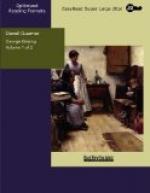were multitudes, alas! who made it the object of their
life-long endeavour to oust Christianity from the
world; if not avowedly, at all events in fact.
Therefore would he describe to them in brief, clear
sentences what really was implied in a struggle between
the parties commonly known as Conservative and Liberal.
He judged no individual; he spoke only of principles,
of a spirit, an attitude. The designs of Russia,
the troubles in Ireland—of these things
he knew little and recked less; they were “party
shibboleths,” and did not concern a Christian
minister in his pulpit. But deeper lay the interests
for which parties nowadays were in truth contending.
It had come to this: are we to believe, or are
we
not to believe that the “kingdom of
God” must have precedence of worldly goods?
The working classes of this country—ah,
how sad to have to speak with condemnation of the
poor!—were being led to think that the only
object worth striving after was an improvement of
their material condition. Marvellous to say,
they were encouraged in this view by people whom Providence
had blessed with all the satisfactions that earth
can give. When the wealthy, the educated thus
repudiated the words of Christ, what could be expected
of those whom supreme Goodness has destined to a subordinate
lot? No! material improvement was
not the
first thing, even for those unhappy people (victims
for the most part of their own improvident or vicious
habits) who had scarcely bread to eat and raiment
wherewith to clothe themselves. Let them seek
the kingdom of God, and these paltry, temporal things
shall surely be added unto them.
This sermon was printed at the office of the Polterham
Mercury, and distributed freely throughout the
town. He had desired no such thing, said Mr.
Vialls, but the pressure of friends was irresistible.
In private, meanwhile, he spoke fiercely against the
Radical candidate, and never with such acrimony as
in Mrs. Mumbray’s drawing-room when Serena was
present. One afternoon he stood up, tea-cup in
hand, and, as his habit was, delivered a set harangue
on the burning topic.
“In one respect,” he urged, after many
other accusations, “I consider that Mr. Quarrier
is setting the very worst, the most debasing, the
most demoralizing example to these working folk, whose
best interests he professes to have at heart.
I am assured (and the witness of my own eyes in one
instance warrants me in giving credit to the charge)
that he constantly enters public-houses, taverns,
even low dram-shops, to satisfy his thirst for strong
liquor in the very face of day, before the eyes of
any one who may happen to be passing. This is
simply abominable If an honourable man has one duty
—one social duty—more incumbent
upon him than another, it is to refrain from setting
an example of intemperance.”
Serena had listened thus far with a look of growing
irritation. At length she could resist no longer
the impulse to speak out.




